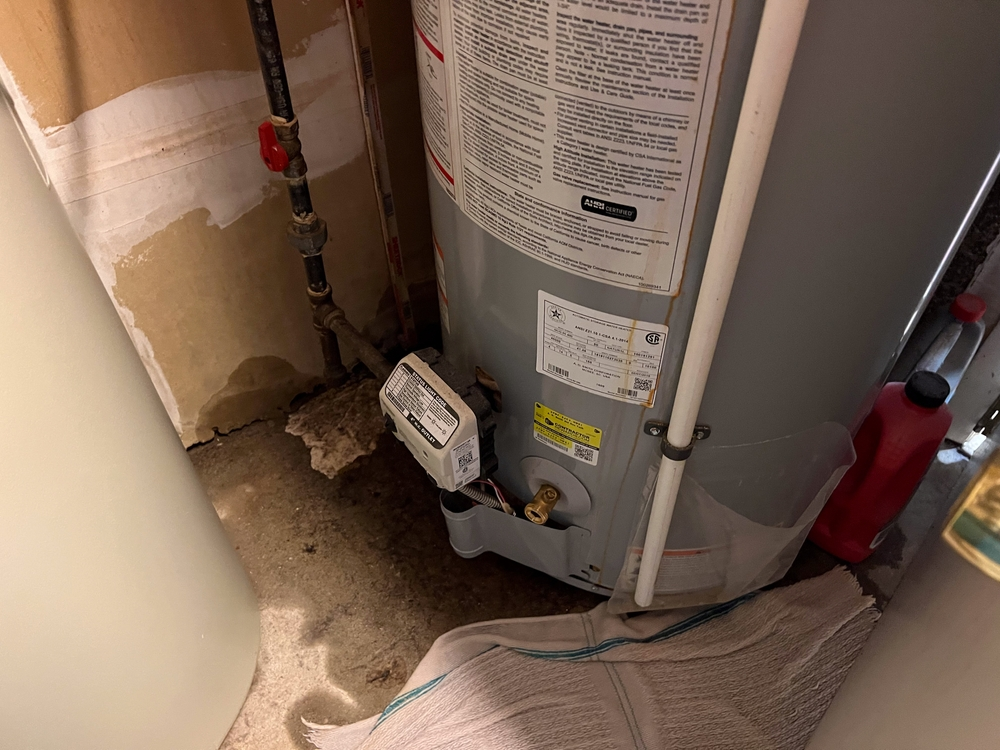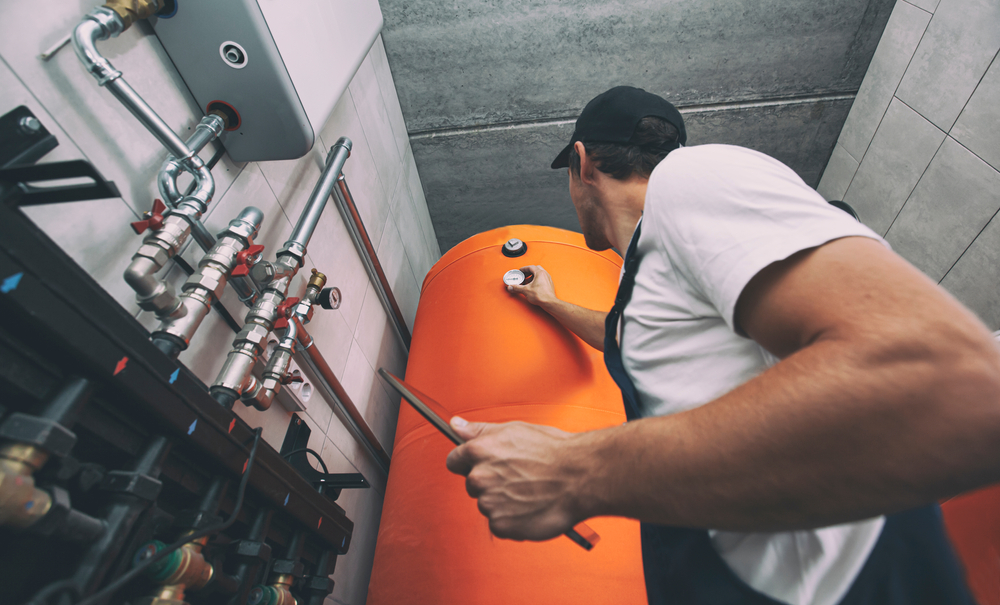Once power sources are securely disconnected, focus on stopping the water flow. Shut down both the main valve and specifically target shutting off cold water access to your hot water heater. By doing so immediately, you’re taking vital steps towards halting leakage and protecting your home from additional harm caused by escaping hot water.
Locating and Using the Shut-Off Valve Safely
To elaborate on the function of the shut-off valve, its primary role is to manage and halt the flow of water during emergency situations. Specifically, locating and operating the cold water shut-off valve is essential in these circumstances. When it’s accessible and safe to do so, turning this valve will cease the Influx of water into your water heater. This can be done by rotating a wheel-style shutoff valve clockwise or pivoting a ball valve handle completely around by 180 degrees.
On occasions where access to your water heater’s specific shut-off valve becomes challenging, an alternative course of action exists—you have the option to close off your home’s main supply line for all incoming water. Although this might take additional effort compared to shutting off just one particular source feeding into the unit, cutting off your entire household’s supply is an immediate containment measure until you can receive professional assistance.
Power Down: Dealing with Electricity and Gas
Disconnect your water heater from the power source before starting cleanup operations. This step is vital for preventing electrical shock and ensuring your safety throughout the process.
If you have an electric water heater, you must find its circuit breaker and switch it OFF to sever the electricity supply. Conversely, when working with a gas water heater, look for the shut-off valve situated at the tank’s base by the gas line. Turning this off will halt the flow of gas.
Diagnosing Your Leaky Water Heater in Big Bear
When you’ve handled the immediate problem, it’s crucial to investigate and locate the origin of the leak to understand what repairs are needed. Often, a water heater leak makes itself known through distinct sounds, including hissing, banging, or noises that suggest water is rushing or dripping.
Additionally:
- Wipe down your water heater’s exterior dry and search for any signs of moisture to ascertain whether the leaking is emanating from within
- Thoroughly check all fittings and connections on the unit
- Try using techniques such as positioning clean rags around its base to see if they get wet again, indicating persistent leaks
Noticeable rust-colored or murky hot water from faucets might mean there’s corrosion in your tank. Also look for rust present on either tank surfaces or valves which could point towards an imminent leak. Vigilance regarding these indicators can help avert complications with your hot water system.
Top Vs Bottom: Where Is That Water Coming From?
Understanding the source of a leak from your water heater is critical. Depending on whether it’s at the top or bottom, various causes and fixes might apply.
If you find that your water heater is leaking from the top, this could be due to excessive pressure within the tank affecting components such as inlet and outlet connections or valves. To tackle leaks at the top, examine both pipes positioned atop your water heater for any indications of loose pipe connections which may contribute to a heater leaking.
Conversely, if leakage stems from underneath, it could point towards an issue with your drain valve — usually found at the base of a cracked storage tank. In dealing with leaks emanating from below, carefully inspecting for corrosion around the drain valve can help identify improper sealing issues. Should there appear no sign of rusting, gently tightening up this valve could mitigate Damage without exacerbating any existing leak problems.
The pressure relief valve on a water heater tank is frequently implicated in leaks, often because it may not function properly under extreme pressure or temperatures. To keep leakage at bay, it’s crucial to periodically change out the anode rod that wards off corrosion inside the tank. For electric water heaters specifically, securing loose nuts or swapping old washers might solve leaks near heating elements. Connections like tubes leading into the top part of the tank and hot and cold water inlets are susceptible to leaking, especially when subjected to significant pressure.
Regular Maintenance to Prevent Future Leaks in Big Bear
It’s critical to prevent leaks before they happen. Regular maintenance on your water heater is key, as it can promptly identify minor leaks, ward off expensive fix-ups, and enhance performance.
Such periodic examinations should consist of searching for signs of rust or corrosion, listening for strange sounds, sniffing out odd smells, and diligently inspecting for any indications of leakage or damage. This will help maintain safety and stave off high repair costs. Preventative care also involves setting a lower temperature to avoid pressure relief valve issues and routinely clearing out sediment from the tank by flushing it and verifying that the pressure relief valve operates correctly.
Annual Check-Ups: Keeping Your Water Heater Healthy
Scheduling professional inspections annually is a vital component of regular maintenance. Such checks are essential for ensuring the water heater operates effectively and avoids leakage.
It is advisable to conduct routine plumbing assessments to predict and prevent possible problems. As part of these yearly inspections, it’s important that the evaluation includes checking the Temperature and Pressure (T&P) relief valve to confirm that it poses no safety hazards.
Sediment Buildup: The Silent Culprit
Maintaining the water heater includes tackling sediment buildup, which can cause the tank’s inner lining to corrode and ultimately result in tank failure. Flushing out sediment and mineral deposits yearly is a preventative measure that helps circumvent expensive repairs while decreasing the likelihood of leaks.
As part of regular upkeep, it’s crucial to replace anode rods within 2-3 years. This step safeguards the integrity of your water heater’s structure and averts potential leakages.
When to Repair vs. Replace: Making the Right Call in Big Bear
After discussing the control and prevention of leaks, let’s delve into a complex issue that many homeowners encounter: how do you determine whether to repair or replace your water heater?
Often, corrosion and sediment accumulation within the water tank’s walls call for replacing the entire water heater. Water heaters older than 10 years, those with leaks at their base, or units performing inconsistently, are candidates for replacement rather than repair. Opting for a newer model boasting energy efficiency could save energy expenses while possibly making you eligible for tax credits and utility rebates. When deciding between repairing and replacing your unit, it is also important to consider warranty terms as they may offset some costs related to these options.
Age Matters: Assessing Your Water Heater’s Lifespan
Exploring the environment. In the aspect of lifespan, it’s important to note that water heaters last between 8 and 12 years. This duration can be affected by several elements which include:
- The physical placement of the unit
- The design specifications of the water heater
- How well the installation was performed
- Regularity with which maintenance is conducted
- Quality level of the supplied water
When deciding whether to repair or substitute a water heater, one critical consideration is its age. Units that are advanced in age tend more towards replacement, especially when they require recurrent fixes.
Expert Intervention: Why Professional Help Is Key
It’s crucial to grasp the intricacies of your water heater and promptly address leaks. Tasks associated with water heaters carry inherent hazards, such as dealing with electrical components, gas supply lines, very hot water, and tanks that operate under pressure. It’s essential to enlist professional help.
Experts in the field guarantee a secure and precise installation of your water heater by adeptly handling the ventilation system and piping connections. This often involves specialized equipment not typically owned by homeowners. It’s worth noting that many warranties for water heaters require installation by a certified technician—unauthorized tampering by non-professionals can lead to warranty invalidation.
Bear Valley Plumbing & Heating: Your Go-To for Leaky Water Heaters
Need expert help for a leaky water heater in Big Bear, California? Your search ends with Bear Valley Plumbing & Heating, the leading HVAC service provider that has been delivering exceptional plumbing, heating and air conditioning solutions to residents since 1978.
Recognized for their rapid response times and availability to provide services 24/7 throughout the year—even on holidays—Bear Valley Plumbing & Heating stands out due to its efficient and polite customer service. The company employs highly trained technicians who are adept at handling everything from simple fixes to complex installations of sophisticated systems such as tankless water heaters.
Schedule Your Water Heater Service Today!
If you notice a small leak, don’t delay in addressing the issue before it escalates. Contact Bear Valley Plumbing & Heating immediately to arrange for professional assistance with your water heater issues. Our team is equipped to deliver top-notch repairs or installations whenever you’re in need.
To book an appointment, feel free to call us at (909) 316-8032 or complete our online form. We’ll ensure that one of our experts visits your residence when it’s most convenient for you. During this visit, they will provide a detailed written estimate, thoroughly outline your options, and make sure you’re aware of any current discounts, promotions, tax credits, and various financing options and rebates that could apply.
Top FAQs to Big Bear Water Heater Leak Professionals
What immediate steps should I take if I spot a leak?
Upon discovering a leak, promptly deactivate the gas or electric power source to your water heater. Close both the main shut-off valve and the cold water supply valve for your hot water heater.
Executing these actions will help mitigate any additional harm and maintain safety.
How can I diagnose a leaky water heater?
To identify a leak in your water heater, pay attention to any strange sounds it may make, look for signs of dampness around it, examine its fittings and connections closely, and be alert for water discoloration that might suggest rust.
Carrying out consistent maintenance on your water heater can assist in averting the development of leaks.
What is the importance of regular maintenance?
To avoid expensive repairs, ensure the longevity of your water heater, and enhance its efficiency, it is vital to perform regular maintenance as it helps identify minor problems before they escalate.
When should I consider replacing my water heater?
If your water heater is exhibiting signs such as erratic operation, leaks around its base or within the tank wall, and if it has surpassed 10 years of age, these are clear indicators that a replacement may be necessary.
Why should I choose Bear Valley Plumbing & Heating for my water heater needs?
Opt for Bear Valley Plumbing & Heating to cater to your water heater requirements. They deliver exceptional services provided by adept technicians who are on standby 24/7 throughout the year.
They are committed to addressing your needs swiftly with their prompt response times.
Related Content: 4 Reason Why You Need To Flush Your Big Bear Water Heater
If you are looking for a Big Bear plumbing, heating & air conditioning contractor, please call (909) 584-4376 or complete our online request form.
Category: Water Heaters




